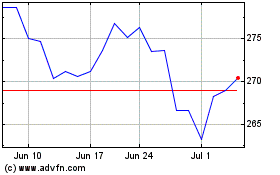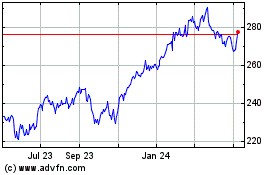Card Firms, Merchants Near Fee Pact -- WSJ
June 29 2018 - 3:02AM
Dow Jones News
By AnnaMaria Andriotis
This article is being republished as part of our daily
reproduction of WSJ.com articles that also appeared in the U.S.
print edition of The Wall Street Journal (June 29, 2018).
Visa Inc. and Mastercard Inc. are close to settling a
long-running antitrust lawsuit with merchants over the fees they
pay when they accept card payments, according to people familiar
with the matter.
Under the settlement, Visa, Mastercard and a number of banks
that issue debit and credit cards including JPMorgan Chase &
Co., Citigroup Inc. and Bank of America Corp. would pay the
merchants around $6.5 billion, some of the people said. It isn't
clear how the payment would be split up among the card networks and
the issuing banks.
The parties on Tuesday informed the U.S. District Court for the
Eastern District of New York that they reached a settlement, the
people said. They intend to draw up a draft of the deal by mid-July
and to submit a final agreement to the court by mid-August, the
people added.
The case has been a highly contentious one for merchants and has
raised questions about the longevity of the credit-card fee model.
At issue are the card-swipe or interchange fees that card networks
set and that merchants pay to banks when consumers use their cards
to shop. Merchants allege that the networks and banks have colluded
to inflate those fees.
They allege that the card networks set fees and card acceptance
rules that benefit the banks. They say Visa and Mastercard do this
in several ways, including by setting the fees that banks then
charge the merchants. Instead, merchants want to be able to
negotiate the fees directly with the banks.
Card industry executives say that card networks and issuers
provide a payments system without which merchant sales would slow
significantly.
Merchants brought the class-action suit against Visa, Mastercard
and the largest U.S. card-issuing banks in 2005. But many large
merchants opted out of the original settlement of $7.25 billion
that was reached in 2012 largely due to terms that would have
barred them from filing lawsuits against the networks over future
swipe-fee increases. An appeals court invalidated that settlement
on the grounds that merchants weren't adequately represented. The
Supreme Court last year declined to hear the case, shifting it back
to the district court.
Around $5 billion of the original settlement amount remained in
escrow, according to people familiar with the matter, and would be
distributed as part of the new settlement if it is approved by the
court.
Merchants that agree to the settlement will be restricted for a
number of years from suing the card networks over the same
card-swipe-fee claims the suit addressed, according to people
familiar with the matter. Merchants who disagree with the terms of
the settlement will be able to opt out and proceed with their own
lawsuits against the networks, the people said.
Several large merchants, including Home Depot Inc. and
Amazon.com Inc., have filed separate lawsuits over the fees. Among
the terms that the merchants are challenging are the card networks'
"honor all cards" requirement. That rule prohibits merchants from
selecting between a network's cards; instead merchants that accept
one Visa credit card, for example, must accept all Visa credit
cards. Swipe fees vary significantly between the networks' cards
and are higher on cards with generous rewards programs.
Credit-card swipe fees typically are comprised of a flat fee
plus a percentage of the dollar amount of a cardholder's purchase.
That percentage can range from around 1% to roughly 3%.
Merchants were dealt a big loss this week when the Supreme Court
backed American Express Co.'s policy of preventing merchants that
accept AmEx cards from offering shoppers discounts or other
incentives to use cheaper cards. The court's decision is a setback
for the merchants' broader ambitions to take on credit card swipe
fees.
Merchants paid card issuers $43.4 billion in Visa and Mastercard
credit card interchange fees in 2017, up from $25.9 billion in
2012, according to the Nilson Report. The increase is largely due
to the ongoing shift in consumers using cards to make more of their
purchases and the introduction of more high-cost cards with
generous rewards programs.
Pricing on debit-card swipe fees was capped by legislation as
part of the 2010 Dodd-Frank Act for institutions with $10 billion
or more in assets. Average debit-card interchange fees per
transaction dropped in 2012, the year after the new pricing went
into effect, and have on average remained steady since then,
according to Federal Reserve data.
Write to AnnaMaria Andriotis at annamaria.andriotis@wsj.com
(END) Dow Jones Newswires
June 29, 2018 02:47 ET (06:47 GMT)
Copyright (c) 2018 Dow Jones & Company, Inc.
Visa (NYSE:V)
Historical Stock Chart
From Mar 2024 to Apr 2024

Visa (NYSE:V)
Historical Stock Chart
From Apr 2023 to Apr 2024
